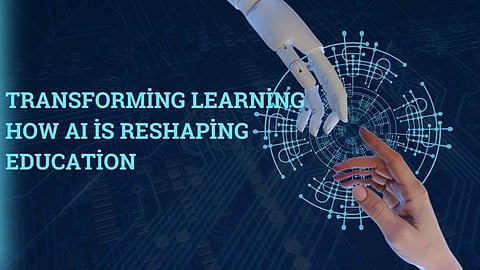

Future of Learning with Artificial Intelligence Education is undergoing a significant transformation, thanks to advancements in Artificial Intelligence (AI). As learning becomes increasingly digital, AI-driven systems are revolutionizing the way students engage with educational content, making personalized learning a reality. Satheesh Kumar Nendrambaka explores these innovations in his latest research, shedding light on how AI is redefining the education sector.
Most conventional classrooms tend to make learning difficult for slight differentials in pace and style of learning for students. Artificial intelligence comes up with adaptation to those needs: personalized lessons. From flexible machine learning algorithms, the dynamic adaptation involves personalized content by assessing the student's performance, preferences, and analysis of their interaction. According to studies, AI-created adaptive learning courses can decrease dropout by 35% and improve the average test score by 18.5%, making AI an increasingly popular tool for current education.
Intelligent Tutoring Systems (ITS) are one of the most impact-generating applications of AI in education. These platforms provide real-time guidance and feedback to aid students from learning complex subjects with personalized support. AI tutors keep track of thousands of interaction points of each student, dynamically altering difficulty levels and recommending additional resources based on the student's performance. Studies suggest that retaining more than 31% of students is made possible through these systems, along with significant enhance problem-solving skills, especially in STEM fields.
With AI, not only are conventional methods of teaching improved, but content delivery is redefined itself. The intelligent content system has many multimedia formats such as videos, interactive simulations, and gamified exercises to enrich users. AI systems can analyze the student's learning patterns to adjust their content in real-time for maximum comprehension. An increase in the engagement of learners by 41% and a 36% improvement in knowledge retention across different schools has been attributed to this.
Assessment methods have also matured, being empowered by AI systems to evaluate and give feedback in real-time. Traditional assessments often miss the true potential of a student because of their static nature. The AI technologies for assessment dynamically regulate difficulty and measure the indicators of competency with extreme accuracy. Studies have shown that institutions applying adaptive methodologies to their assessments experience a 27% reduction in student dropouts and a 34% increase in academic success.
These intelligent assessment systems also develop students' metacognitive skills through understanding their learning behavior patterns and key knowledge gaps. A personalized dashboard showing the strengths and weaknesses of an individual put the learner in charge of his or her own learning. AI assessment tools can also act as early detection systems for learning progress issues so that timely support can be ensured. This continuous form of evaluation diminishes test anxiety and motivates constant engagement as opposed to last-minute cramming. As technologies further develop, this enhancement will turn assessment from pure measurement into an integral component of the learning process itself, elaborating a seamless cycle of instruction, practice, feedback, and growth.
One of the most important contributions of AI to the education field is the power to detect and close knowledge gaps. AI captures behavioral patterns followed by performance data that identify students who are in risk of falling behind and therefore suggests timely appropriate solutions. It has been noted that students using AI-based learning assistance reduced their time remediating by 42%, timely helps ensure students get supported on the right time. Similarly, using AI to track engagement behavior on a sustained basis has provided benefits in motivating students, such as a 47% increase in sustained efforts for learning.
Considerable advancement will have basically been made on artificial intelligence technology by the time it is even comprehensively being used in education. Innovations already in development like multimodal learning analysis and emotional expression recognition will only further enliven the pursuit of better learning environments. The enhancement is expected to achieve more than a 35% efficiency gain from learning in the coming years, according to researchers in next-generation AI platforms. These improvements will continue building a future of educational availability and, even more so, of absolute personalization to each student's specific needs.
AI enabled adaptive assessment tools would significantly change the context by which teachers refer progress among students: from standardized testing to more continuous dynamic evaluation. Visual vividness through AI-based virtual reality will open up abstract ideas into concrete forms. It will also be delivered by AI mentorship systems all day and every day, catering to specific learning styles of students the times when a human instructor is not available. This new technology will make it possible for everyone everywhere to be democratized in the quality of education and with regards to the varied needs of individuals in learning.
The adaptability, engagement, and efficiency of learning are the next levels of education AI is propelling. By providing intelligent tutoring systems, smart content delivery, and adaptive assessment capabilities for AI, the older gaps are being mended toward an inclusive educational environment. The study by Satheesh Kumar Nendrambaka mentioned that the most remarkable opportunities are embedded in the very application of AI in education, where students acquire support to thrive in an emerging digital landscape.
